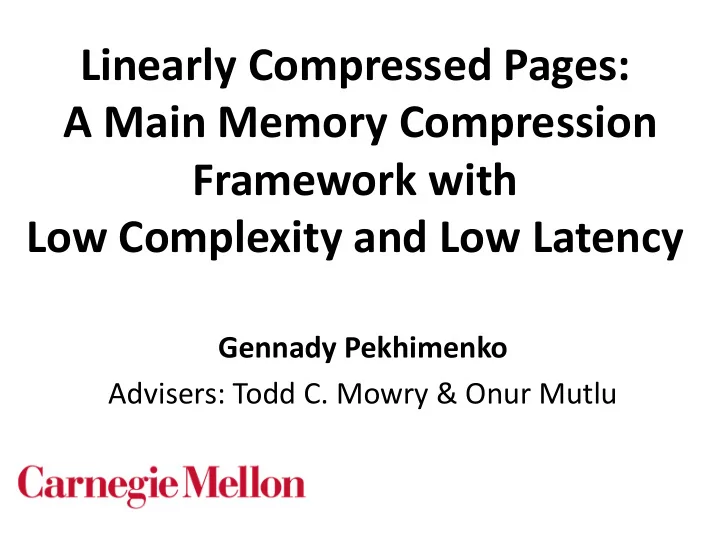

Linearly Compressed Pages: A Main Memory Compression Framework with Low Complexity and Low Latency Gennady Pekhimenko Advisers: Todd C. Mowry & Onur Mutlu
Executive Summary Main memory is a limited shared resource Observation : Significant data redundancy Idea : Compress data in main memory Problem : How to avoid latency increase? Solution : Linearly Compressed Pages (LCP): fixed-size cache line granularity compression 1. Increases capacity ( 69% on average) 2. Decreases bandwidth consumption ( 46% ) 3. Improves overall performance ( 9.5% ) 2
Challenges in Main Memory Compression 1. Address Computation 2. Mapping and Fragmentation 3. Physically Tagged Caches 3
Address Computation Cache Line (64B) Uncompressed L 0 L 1 L 2 . . . L N-1 Page Address Offset 128 0 (N-1)*64 64 Compressed L 0 L 1 L 2 . . . L N-1 Page Address Offset 0 ? ? ? 4
Mapping and Fragmentation Virtual Page (4kB) Virtual Address Physical Address Physical Page Fragmentation ( ? kB) 5
Physically Tagged Caches Virtual Core Address Critical Path Address Translation TLB Physical Address tag data L2 Cache tag data Lines tag data 6
Shortcomings of Prior Work Compression Access Decompression Complexity Compression Mechanisms Latency Latency Ratio IBM MXT [IBM J.R.D. ’01] 7
Shortcomings of Prior Work Compression Access Decompression Complexity Compression Mechanisms Latency Latency Ratio IBM MXT [IBM J.R.D. ’01] Robust Main Memory Compression [ISCA’05] 8
Shortcomings of Prior Work Compression Access Decompression Complexity Compression Mechanisms Latency Latency Ratio IBM MXT [IBM J.R.D. ’01] Robust Main Memory Compression [ISCA’05] LCP: Our Proposal 9
Linearly Compressed Pages (LCP): Key Idea Uncompressed Page (4kB: 64* 64B ) . . . 64B 64B 64B 64B 64B 4:1 Compression Exception M E . . . Storage Metadata (64B): Compressed Data ? (compressible) (1kB) 10
LCP Overview • Page Table entry extension – compression type and size – extended physical base address • Operating System management support – 4 memory pools (512B, 1kB, 2kB, 4kB) • Changes to cache tagging logic – physical page base address + cache line index (within a page) • Handling page overflows • Compression algorithms: BDI [PACT’12] , FPC [ISCA’04] 11
LCP Optimizations • Metadata cache – Avoids additional requests to metadata • Memory bandwidth reduction: 1 transfer 64B 64B 64B 64B instead of 4 • Zero pages and zero cache lines – Handled separately in TLB (1-bit) and in metadata (1-bit per cache line) • Integration with cache compression – BDI and FPC 12
Methodology • Simulator – x86 event-driven simulators • Simics-based [Magnusson+, Computer’02] for CPU • Multi2Sim [Ubal+, PACT’12] for GPU • Workloads – SPEC2006 benchmarks, TPC, Apache web server, GPGPU applications • System Parameters – L1/L2/L3 cache latencies from CACTI [Thoziyoor+, ISCA’08] – 512kB - 16MB L2, simple memory model 13
Compression Ratio Comparison SPEC2006, databases, web workloads, 2MB L2 cache Zero Page FPC Compression Ratio 3.5 LCP (BDI) LCP (BDI+FPC-fixed) MXT LZ 3 2.60 2.5 2.31 2 1.69 1.62 1.59 1.5 1.30 1 GeoMean LCP -based frameworks achieve competitive average compression ratios with prior work 14
Bandwidth Consumption Decrease SPEC2006, databases, web workloads, 2MB L2 cache FPC-cache BDI-cache FPC-memory (None, LCP-BDI) (FPC, FPC) (BDI, LCP-BDI) Normalized BPKI (BDI, LCP-BDI+FPC-fixed) 1.2 1 0.89 0.92 Better 0.8 0.63 0.57 0.55 0.54 0.54 0.6 0.4 0.2 0 GeoMean LCP frameworks significantly reduce bandwidth ( 46 %) 15
Performance Improvement Cores LCP-BDI (BDI, LCP-BDI) (BDI, LCP-BDI+FPC-fixed) 1 6.1% 9.5% 9.3% 2 13.9% 23.7% 23.6% 4 10.7% 22.6% 22.5% LCP frameworks significantly improve performance 16
Conclusion • A new main memory compression framework called LCP(Linearly Compressed Pages) – Key idea: fixed size for compressed cache lines within a page and fixed compression algorithm per page • LCP evaluation: – Increases capacity ( 69% on average) – Decreases bandwidth consumption ( 46% ) – Improves overall performance ( 9.5% ) – Decreases energy of the off-chip bus ( 37 %) 17
Linearly Compressed Pages: A Main Memory Compression Framework with Low Complexity and Low Latency Gennady Pekhimenko Advisers: Todd C. Mowry & Onur Mutlu
Recommend
More recommend